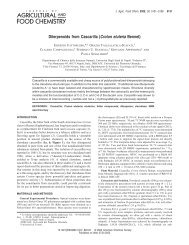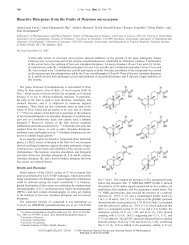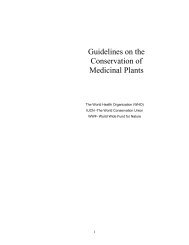- Page 1 and 2: GOVERNMENT OF TAMIL NADUBOTANYHIGHE
- Page 3 and 4: CONTENTSBOTANYUNIT I: Diversity of
- Page 5 and 6: TNAU B.Sc. Agriculture, B.Sc. Horti
- Page 7 and 8: Research Institutions in various ar
- Page 9 and 10: Chapter1Unit I: Diversity ofLiving
- Page 11 and 12: (a)Nucleus(b)to change is called Ho
- Page 13 and 14: 1892 Dimitry Ivanowsky proved thatv
- Page 15 and 16: 1.2.6 BacteriophageViruses infectin
- Page 17 and 18: are similar to viroids but they are
- Page 19 and 20: Table 1.4: Systems of Classificatio
- Page 21 and 22: Table 1.5: Comparison of Five Kingd
- Page 23 and 24: CoccusDiplococcusStaphylococcusTetr
- Page 25 and 26: MesosomesThese are localized infold
- Page 27 and 28: What are Magnetosomes ?Intracellula
- Page 29: with the help of pili. The pilus gr
- Page 33 and 34: Table 1.10: Human diseases caused b
- Page 35 and 36: • The reserve food material isCya
- Page 37 and 38: logos - study). P.A. Micheli is con
- Page 39 and 40: TrichogyneMicroconidia(f) Sporangia
- Page 41 and 42: Zygomycetes• Most of the species
- Page 43 and 44: fungi, stink horns, rusts and smuts
- Page 45 and 46: like Amylase, Protease, Lactase etc
- Page 47 and 48: and multinucleate structures which
- Page 49 and 50: Figure 1.29: V.S. of Agaricus gillb
- Page 51 and 52: evenly distributed in the thallus)
- Page 53 and 54: 6. Differentiate Homoiomerous andHe
- Page 55 and 56: Chapter2Plant KingdomLearning Objec
- Page 57 and 58: 2.2 Life Cycle Patterns in PlantsAl
- Page 59 and 60: FlagellaChloroplastOogoniumAntherid
- Page 61 and 62: Autospores (spores which look simil
- Page 63 and 64: r-phycocyanin are the photosyntheti
- Page 65 and 66: ReproductionOedogonium reproduces b
- Page 67 and 68: cells are elongated and possesses a
- Page 69 and 70: • Sexual reproduction is Oogamous
- Page 71 and 72: GametophyteThe plant body of Marcha
- Page 73 and 74: The sporophyte is not free-living b
- Page 75 and 76: 4. Development of Bulbils on the rh
- Page 77 and 78: 2.5 PteridophytesSeedless Vascular
- Page 79 and 80: Division-PTERIDOPHYTASub divisionPs
- Page 81 and 82:
but it is viewed to be associated w
- Page 83 and 84:
microsporangium and megaspores inme
- Page 85 and 86:
The epidermis is the outermost laye
- Page 87 and 88:
1. Protostele:In protostele phloem
- Page 89 and 90:
a) Cycas b) Thuja c) Taxus d) Ginkg
- Page 91 and 92:
2.6.4 CycasClass - CycadopsidaOrder
- Page 93 and 94:
of the rachis is the arrangement of
- Page 95 and 96:
consists of 3 layers, the outer and
- Page 97 and 98:
(ii) Dwarf shoot or branches of lim
- Page 99 and 100:
Figure 2.53b Pinus Pollen Grainc) A
- Page 101 and 102:
parts of the extinct plants are obt
- Page 103 and 104:
The sporangia with spores are found
- Page 105 and 106:
ICT CornerDifferent forms of plants
- Page 107 and 108:
3.1 HabitThe general form of a plan
- Page 109 and 110:
I. Characteristic features• Root
- Page 111 and 112:
3.5.2 Modifications of rootI. Tap r
- Page 113 and 114:
3. Sucking or Haustorial rootsThese
- Page 115 and 116:
3.6.2 Types of StemMajority of angi
- Page 117 and 118:
CladodePhyllocladeSpineScaly leafRu
- Page 119 and 120:
4. TuberThis is a succulent undergr
- Page 121 and 122:
2. Palmately reticulate venation(mu
- Page 123 and 124:
AlternatePolyalthia4. Whorled (vert
- Page 125 and 126:
(a) (b) (c) (d) (e)Figure 3.16: Typ
- Page 127 and 128:
3. Plicate or plaited - when the le
- Page 129 and 130:
6. Draw and label the parts of regi
- Page 131 and 132:
Chapter4Reproductive MorphologyLear
- Page 133 and 134:
4.1.2 Based on branching pattern an
- Page 135 and 136:
f. Panicle: A branched raceme is ca
- Page 137 and 138:
Figure 4.6: (b) diagrammatic,(c) Mo
- Page 139 and 140:
4.2 FlowerIn a plant, which part wo
- Page 141 and 142:
Figure 4.13: (a)ActinomorphicFigure
- Page 143 and 144:
Figure 4.17: (a)TrimerousFigure 4.1
- Page 145 and 146:
Figure 4.21: (d)CampanulateFigure 4
- Page 147 and 148:
4.3.7 Aestivation: Arrangement of s
- Page 149 and 150:
c. Gynostegium:Connation product of
- Page 151 and 152:
4.4.7 Anther dehiscing directionIt
- Page 153 and 154:
CorollaAnthophoreCalyxSaffron flowe
- Page 155 and 156:
4.6 Construction of floral diagrama
- Page 157 and 158:
Br : Bracteate.Ebr : EbracteateBrl
- Page 159 and 160:
Berry (Tomato)Drupe (Mango)Pepo (Cu
- Page 161 and 162:
is free from seed coat. Example: Cl
- Page 163 and 164:
FruitsSimpleAggregateMultipleEtaeri
- Page 165 and 166:
4.8 SeedDo all fruits contain seeds
- Page 167 and 168:
ICT CornerFloral diagram and floral
- Page 169 and 170:
laid strong foundation for the bino
- Page 171 and 172:
Another concept emphasises the prod
- Page 173 and 174:
erecto folius compositis. It means
- Page 175 and 176:
Regional FloraIt includes large geo
- Page 177 and 178:
Botanical garden contains special p
- Page 179 and 180:
International HerbariumS.No Herbari
- Page 181 and 182:
Taxonomists have assigned a methodo
- Page 183 and 184:
Seed plantsClass IDicotyledonaeClas
- Page 185 and 186:
Figure 5.8: Adolph Engler and Karl
- Page 187 and 188:
Monocots are classified into 11 ord
- Page 189 and 190:
1. Easily visible characters like s
- Page 191 and 192:
the form of a tree called phylogene
- Page 193 and 194:
based on shared apomorphic characte
- Page 195 and 196:
Flowers: Bracteate, bracteolate(Ses
- Page 197 and 198:
are dithecous, basifixed, introse a
- Page 199 and 200:
Economic ImportanceEconomicimportan
- Page 201 and 202:
5.13.2 Family: Apocynaceae (milk we
- Page 203 and 204:
FlowerLeafFruitCorollaSepalCalyxL.S
- Page 205 and 206:
Economic importance of the family A
- Page 207 and 208:
5.13.3 Family: Solanaceae (Potato F
- Page 209 and 210:
LeafStamenCorollaStamenCorollaCalyx
- Page 211 and 212:
Habit: A small annual herbRoot: Bra
- Page 213 and 214:
5.13.4 Family: Euphorbiaceae (Casto
- Page 215 and 216:
Botanical Description Of Ricinus co
- Page 217 and 218:
Economic importance of the family E
- Page 219 and 220:
HeliconiaceaeSystematic PositionAPG
- Page 221 and 222:
LeafSpatheFlowerFruitBranchedspadix
- Page 223 and 224:
Economic Importance of The Family M
- Page 225 and 226:
in species of Smilax it is reticula
- Page 227 and 228:
Economic importance of the family l
- Page 229 and 230:
State Flower of Tamil NaduGloriosa
- Page 231 and 232:
as karyotaxonomy. The application o
- Page 233 and 234:
Chapter6Unit III: Cell biology andB
- Page 235 and 236:
microscopic organisms therefore it
- Page 237 and 238:
Microscopic measurements:The micros
- Page 239 and 240:
Comparison of MicroscopesFeaturesSo
- Page 241 and 242:
These solutes may be homogeneous(so
- Page 243 and 244:
of nuclear material. The DNA is wit
- Page 245 and 246:
The first cell might have evolvedap
- Page 247 and 248:
In plant, cell wall shows three dis
- Page 249 and 250:
Figure 6.13: Transport of molecules
- Page 251 and 252:
The largest of the internal membran
- Page 253 and 254:
time faster than DNA in the nucleus
- Page 255 and 256:
Ribosome consists of RNA andprotein
- Page 257 and 258:
v. Tannins in Mimosa pudica.vi. Rap
- Page 259 and 260:
secondary constrictions are called
- Page 261 and 262:
chromosome forms the chromosomal ax
- Page 263 and 264:
c. Smears: Here the specimen is in
- Page 265 and 266:
organisms are classified into proka
- Page 267 and 268:
ICT CornerCell structureCell-The un
- Page 269 and 270:
7.1 History of a CellTable 7.1: His
- Page 271 and 272:
Figure 7.1: Cell cyclethe cell cycl
- Page 273 and 274:
Drawbacks of Amitosis• Causes une
- Page 275 and 276:
the key regulatory proteins at the
- Page 277 and 278:
organs. It results in the formation
- Page 279 and 280:
Figure 7.8: MeiosisTelophase IIFour
- Page 281 and 282:
Summary273
- Page 283 and 284:
ICT CornerCell divisionHow cells ar
- Page 285 and 286:
222222BiomoleculesOrganic compounds
- Page 287 and 288:
8.2 Primary and SecondaryMetabolite
- Page 289 and 290:
8.3.2 DisaccharidesDisaccharides ar
- Page 291 and 292:
8.3.8 ChitinChitin is a homo polysa
- Page 293 and 294:
linoleic acid) the hydrocarbon chai
- Page 295 and 296:
8.5 ProteinsProteins are the most d
- Page 297 and 298:
8.5.2 Structure of ProteinProtein i
- Page 299 and 300:
colour develops without heating (Fi
- Page 301 and 302:
8.6.3 Factors Affecting the Rate of
- Page 303 and 304:
allosteric inhibitors. Eg. The enzy
- Page 305 and 306:
LyaseLigaseEnzymesMode ofactionBrea
- Page 307 and 308:
A characteristic feature that diffe
- Page 309 and 310:
Blue bands - Twosugar-phosphatechai
- Page 311 and 312:
Evaluation1. The most basic amino a
- Page 313 and 314:
ReferencesUnit 1: Diversity of Livi
- Page 315 and 316:
GlossaryAcetyl CoAActive siteAkinet
- Page 317 and 318:
English - Tamil TerminologyAcropeta
- Page 319 and 320:
Competitive Examination QuestionsUn
- Page 321 and 322:
22. Which one of the following stat
- Page 323 and 324:
18. How many plants in the list giv
- Page 325 and 326:
BOTANICAL NAMES AND COMMON NAMESS.N
- Page 327 and 328:
64 Musa paradisiaca Banana வா










